|
Printables |
PowerPoints |
Online exercises |
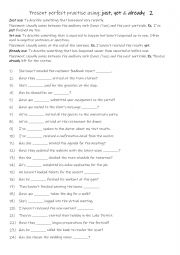
|
A2-B1 Present perfect practise using just, yet & already 2
Learning the present perfect tense with just, yet, and already is essential because these time adverbs allow students to express recent actions, expectations, and accomplishments clearly and concisely. Just helps highlight very recent actions (e.g., I have just finished my homework), making communication precise and current. Yet is vital for asking...
Level: elementary
Age: 10-100
Type:
Downloads: 109
|
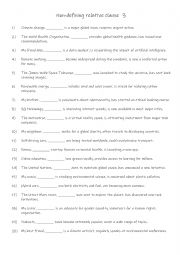
|
Non-defining relative clause 3
Students complete the gap-fill with the correct word. Answers on page 2.
Level: elementary
Age: 8-100
Type:
Downloads: 110
|
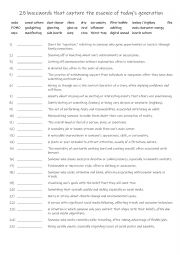
|
B1+-C1 25 buzzwords that capture the essence of today�s generation
Learning modern buzzwords like woke, cancel culture, FOMO, ghosting, and digital nomad is essential for understanding and participating in conversations that capture the values, trends, and social concerns of today�s generation. These words help us articulate cultural phenomena, such as eco-anxiety and hustle culture, reflecting shared anxieties an...
Level: intermediate
Age: 10-100
Type:
Downloads: 104
|
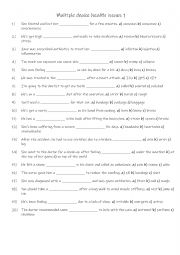
|
A2-B1 Multiple choice health issues 1
Students read the sentences and choose the correct word out of the given choices. Answers on page 2.
Level: elementary
Age: 8-100
Type:
Downloads: 111
|
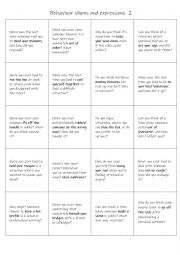
|
B1+-C1 Behaviour idioms and expressions - speaking reinforcement activity 2
This is a speaking reinforcement activity to supplement the other worksheet. Students working in pairs or small groups can either ask each other the questions or answer the question themselves.
Level: intermediate
Age: 12-100
Type:
Downloads: 111
|
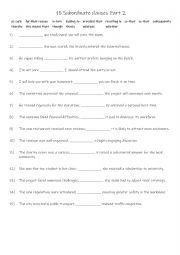
|
A2-B1 15 Subordinate clauses Part 2
Using subordinate clauses allows for more complex and nuanced sentences, helping to convey ideas clearly and effectively. Mastery of subordinate clauses can enhance writing style, making it more sophisticated and engaging. Subordinate clauses help clarify relationships between ideas, such as cause and effect or conditions, making arguments and nar...
Level: intermediate
Age: 9-100
Type:
Downloads: 103
|
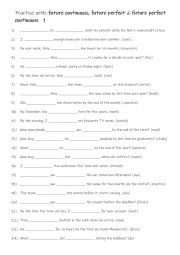
|
B1-B2 Practise with future continuous, future perfect & future perfect continuous 1
Students should learn the future continuous, future perfect, and future perfect continuous tenses to express a variety of future actions and events more clearly. The future continuous describes ongoing actions at a specific future time, the future perfect indicates actions that will be completed before a certain future point, and the future perfect...
Level: intermediate
Age: 9-100
Type:
Downloads: 116
|
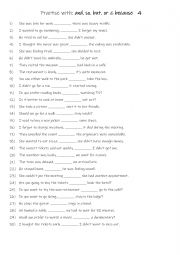
|
A1+- A2 Practise with and, so, but, or & because 4
First, students need to familiarise themselves with the 5 linkers and their usage. Then they read the sentences to see which one is needed to complete the gap-fill. Each conjunction is used 6 times! Answers on page 2.
Level: elementary
Age: 9-100
Type:
Downloads: 107
|
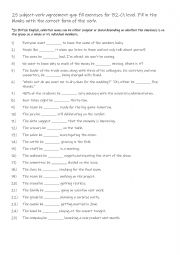
|
25 subject-verb agreement gap fill exercises for B2-C1 level.
25 subject-verb agreement gap fill exercises for B2-C1 level. Fill in the blanks with the correct form of the verb.
*In British English, collective nouns can be either singular or plural depending on whether the emphasis is on the group as a whole or its individual members.
Answers are given with an explanation on page 2.
Level: advanced
Age: 14-100
Type:
Downloads: 126
|
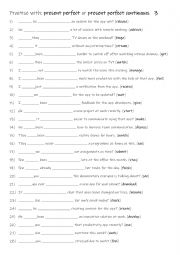
|
A2+-B1 Practise with present perfect or present perfect continuous 3
First Students familiarise themselves with the 2 tenses and their use. Then they read the sentences to work out which one is needed to complete the gap-fill using the infinitive in (). Each tense is used 14 times! Answers on page 2
Level: elementary
Age: 9-100
Type:
Downloads: 113
|
|
|
|
|












